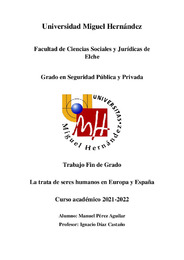Resumen :
Introducción: La trata de seres humanos es un delito en el que se compra, vende y utiliza a las personas, con la finalidad de que terceras personas obtengan beneficios económicos de su explotación, pudiendo entenderse como un negocio criminal. Así mismo, la trata de seres humanos es una de las industrias del crimen organizado que más ha crecido en los últimos años a nivel mundial, solo después del tráfico de drogas y armas, lo que ha supuesto un incremento exponencial del interés de los gobiernos por solventar y erradicar el problema
Objetivos e hipótesis: El objetivo general de esta investigación se centra en analizar la relación entre la irrupción de la web 2.0 (año 2004), y el incremento de las víctimas de la trata de seres humanos en Europa y España. Para ello se han planteado la siguiente hipótesis: “La irrupción de la Web 2.0 (año 2004), ha conllevado un incremento de las víctimas de trata de seres humanos”
Metodología: Para la investigación se ha optado por una metodología centrada en una revisión de la literatura, la cual tiene como finalidad la recopilación y descripción de la información publicada al respecto. Posteriormente, se han seleccionado diversas publicaciones con estadísticas oficiales al respecto, tanto a nivel nacional como internacional, con el fin de analizar los principales hallazgos sobre el tema.
Conclusiones: el delito de la trata de seres humanos se ha visto exponencialmente incrementado con la llegada de la web 2.0, lo que ha supuesto un aumento de las víctimas de la trata de seres humanos en Europa y España, debido a los diversos recursos, aplicaciones, programas y comunidades virtuales que facilitan las comunicaciones, creación de contenido, y consolidación de grupos online, en los cuales es más sencillo llegar a una población objeto, seleccionar y reclutar a las posibles víctimas.
Introduction: Human trafficking is a crime in which people are bought, sold and used, with the purpose that third parties obtain economic benefits from their exploitation, being able to be understood as a criminal business. Likewise, human trafficking is one of the industries of organized crime that has grown the most in recent years worldwide, only after drug and arms trafficking, which has led to an exponential increase in the interest of governments to solve and eradicate the problem.
Objectives and hypotheses: The general objective of this research focuses on analyzing the relationship between the irruption of Web 2.0 (2004) and the increase in the number of victims of human trafficking in Europe and Spain. To this end, the following hypothesis has been put forward: "The irruption of Web 2.0 (2004) has led to an increase in the number of victims of human trafficking".
Methodology: For the research we have opted for a methodology focused on a literature review, which aims to collect and describe the information published on the subject. Subsequently, various publications with official statistics on the subject, both nationally and internationally, have been selected in order to analyze the main findings on the subject. Conclusions: the crime of human trafficking has increased exponentially with the advent of Web 2.0, which has led to an increase in the number of victims of human trafficking in Europe and Spain, due to the various resources, applications, programs and virtual communities that facilitate communications, content creation, and consolidation of online groups, in which it is easier to reach a target population, select and recruit potential victims.
|
 La licencia se describe como: Atribución-NonComercial-NoDerivada 4.0 Internacional.
La licencia se describe como: Atribución-NonComercial-NoDerivada 4.0 Internacional.
.png)
